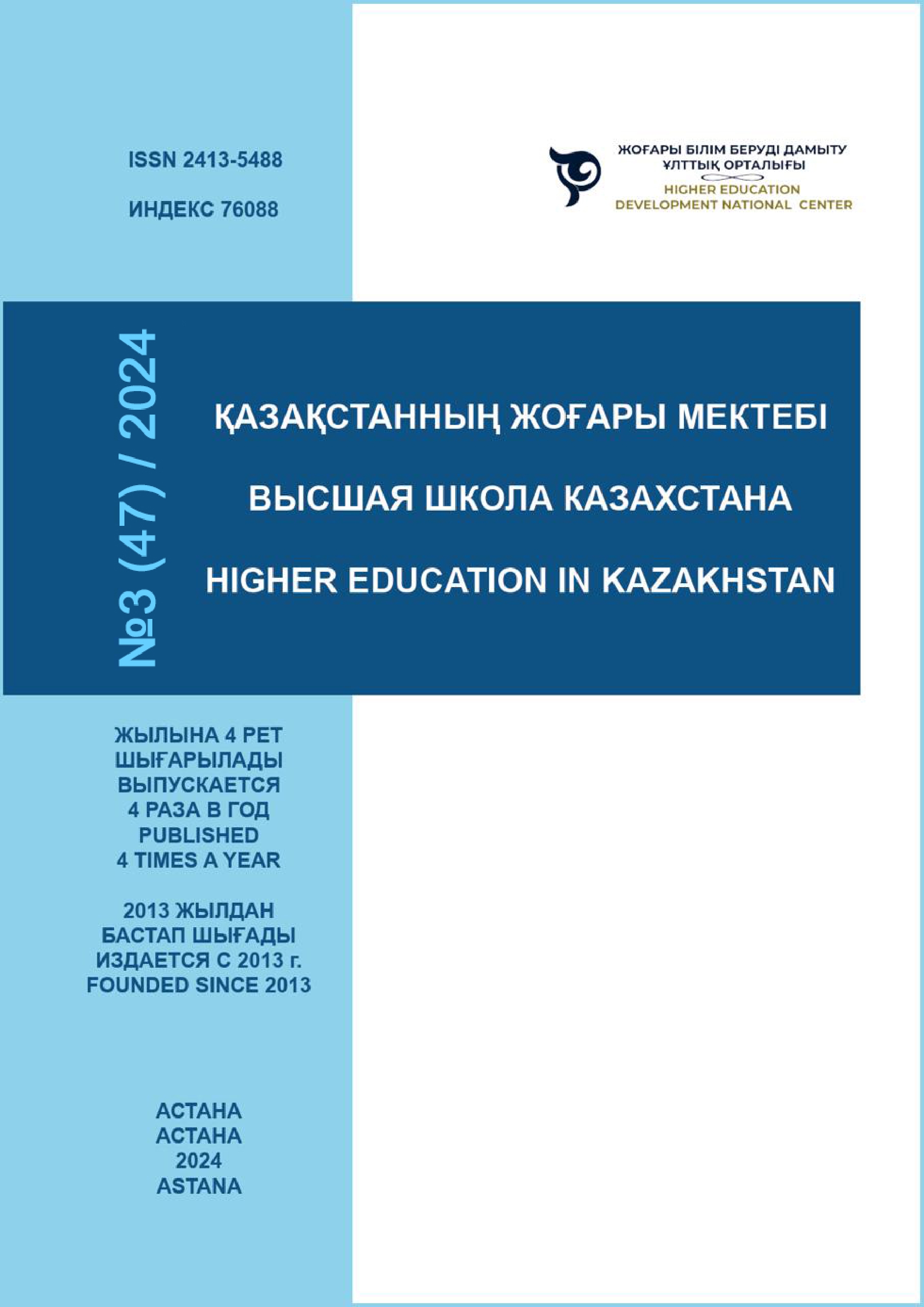SURVEYING METHODOLOGICAL COMPETENCE IN COMPUTER SCIENCE: IMPLICATIONS FOR PROFESSIONAL GROWTH
DOI:
https://doi.org/10.59787/2413-5488-2024-47-3-119-130Аңдатпа
In the contemporary landscape, characterized by widespread informatization, including in education, there is a growing need for both fundamental and applied training in leveraging information and communication technologies (ICT). This article explores how enhancing the methodological competence of computer science educators impacts the development of students' key competencies. Given the high societal demand for well-educated professionals, educational quality is crucial, necessitating rigorous standards.
The article critically analyzes the concepts of "competence" and "competency" from various scholarly perspectives, highlighting the significant role of a teacher's competence in the professional growth of future educators. Practical research focused on developing methodological competence helps students deepen their theoretical understanding, enhance pedagogical skills, and cultivate professional and personal qualities, fostering creativity and independence.
It also identifies trends in teacher education within higher education, considering the effects of a two-tier system and professional teaching standards. The article defines "methodological competence" and "professional competence," noting that despite varying scholarly views, it generally includes theoretical knowledge and practical skills. These competencies enable educators to innovate and apply diverse pedagogical methods, thereby fostering student competencies.
Әдебиеттер тізімі
Agapov, A. &Mysina, T. (2022) The Relationship of Subject Methodological Skills, Analytical and Communicative Competencies of Pedagogical Students. European Proceedings of Educational Sciences, 58-68. https://doi.org/10.15405/epes.22043.6
Aleksіeіenko-Lemovska, L. (2022). Methodological competence development of preschool teachers in the system of continuous education. Polonia University Scientific Journal, 53(4), 9-20. https://doi.org/10.23856/5301
Biloshchytskyi, A., Omirbayev, S., Mukhatayev, A., Faizullin, A., Toxanov, S. & Kassenov, K. (2020). Research on the formation level of methodological competence of it disciplines teachers. ATIT 2020 - Proceedings: 2020 2nd IEEE International Conference on Advanced Trends in Information Theory. https://doi.org/10.1109/ATIT50783.2020.9349337
Cherryholmes, C. (2013). Notes on Pragmatism and Scientific Realism. Educational Researcher, 21(6), 13–17.
Garcia, M. (2009). Enhancing Methodical Competence in Science Teaching: Innovative Approaches and Best Practices. Science Education International, 8, 12-23.
Hattie, J. (2003). Teachers Make a Difference, What is the research evidence? Australian Council for Educational Research. https://www.researchgate.net/publication/252090858_Teachers_Make_a_Difference_What_is_the_research_evidence
Ifenthaler, D. (2014). Curriculum Models for the 21st Century Using Learning Technologies in Higher Education. Springer Science Business Media New York. https://doi.org/10.1007/978-1-4614-7366-4
Khutorskoy, A. (2003). Key competencies as a component of the personality-oriented paradigm of education. Public Education, 2, 58-64.
Lapchik M., Semakin I. & Henner E. (2015). Methods of teaching computer science. Academy, 624.
Law, N., Pelgrum W.J. & Plomp, T. (2008) Pedagogy and ICT Use in Schools around the World. Springer Dordrecht. https://doi.org/10.1007/978-1-4020-8928-2
Manolis, C., Burns, D. J., Assudani R. & Chinta, R. (2013). Assessing experiential learning styles: A methodological reconstruction and validation of the Kolb Learning Style Inventory. Learning and Individual Differences, 23, 44-52, https://doi.org/10.1016/j.lindif.2012.10.009.
Mukhatayev, A., Omirbayev, S., Kassenov, K., Biloshchytskyi, A. & Omarova, S. (2024). Perception of IT teachers on their methodological development: A case at Kazakhstan universities. International Journal of Innovative Research and Scientific Studies,. 7(4), 1354–1364. https://doi.org/10.53894/ijirss.v7i4.3297
Romanyuk, S., Rusnak, I., Dolynskiy, I., Maftyn, L.& Onyshkiv, Z. (2022) Competence-Based Readiness of Future Teachers to Professional Activity in Educational Institutions. Journal of Curriculum and Teaching, 11(2):42. https://doi.org/10.5430/jct.v11n2p42 Bygstad, B., Ovrelid, E., Ludvigsen S. & Daehlen M. (2022). From dual digitalization to digital learning space: Exploring the digital transformation of higher education. Computers&Education. https://doi.org/10.1016/j.compedu.2022.104463
Rychen, D., & Salganik, L. (Eds.). (2003). Key competencies for a successful life and a well-functioning society. Hogrefe & Huber Publishers.
Sharifbaeva K., Niyazova G. & Abdurazzakova D. (2022) Formation of methodical competence of special subjects teachers in technical universities. AIP Conference Proceedings, 2432(1), 050043. https://doi.org/10.1063/5.0089618
Vlasenko, T. (2019). A Methodological Approach to Evaluating the Level of Staff Competence for Implementation of Strategic Changes. https://doi.org/10.32983/2222-4459-2019-9-339-344
Voogt, J., Knezek, G., Christensen, R. & Lai, K.-W. (2018). Second Handbook of Information Technology in Primary and Secondary Education.














